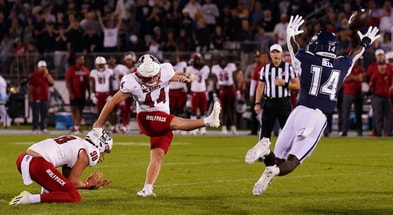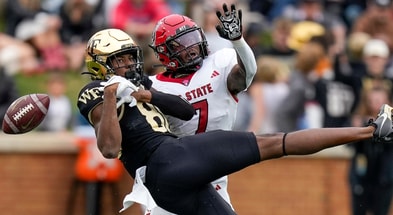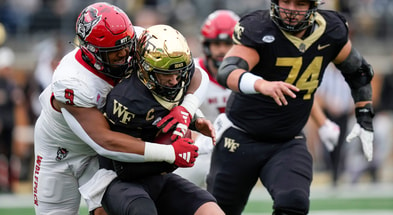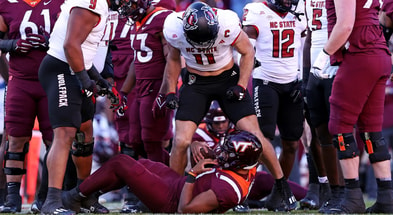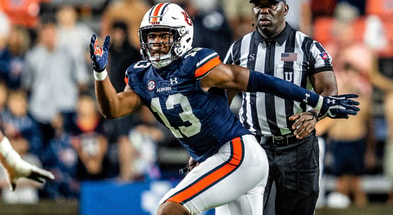Tim Peeler: NC State finished its season on a historic pace
No matter what happens in NC State’s postseason bowl game in this year’s grand finale, the Wolfpack’s five-game winning streak to end the 2023 regular season will go down in history as one of the best in program history.
In fact, only twice before has the Pack won this many games at the end of a season: eight in a row in 1927 under head coach Gus Tebell and five in a row in 1965 under coach Earle Edwards.
Both of those teams won disputed conference championships those season, something this year’s team cannot claim after finishing third in a 15-team Atlantic Coast Conference. But neither, unlike coach Dave Doeren’s 11th edition, were invited to play in a bowl game, back when college football had no more than 10 postseason games.
Why were the conference titles disputed? For reasons that are fascinating viewed through the lens of modern college football.
In 1927, Tebell’s Wolfpack was of four teams to finish without a loss in the unwieldy 22-team Southern Conference standings. It was the only one to finish without a tie, however, and uses that basis to claim its only title during its three decades in the SoCon. The Pack, led by All-America halfback Jack McDowall, won its only four games against league opponents: Clemson (18-6), Florida (12-6), North Carolina (19-6) and South Carolina (34-0).
The Pack finished with a 9-1 overall record, thanks to a Week 2 loss at Furman and its eight-game winning streak to finish out the schedule.
Meanwhile, Georgia Tech, Tennessee and Vanderbilt also finished without a loss to a Southern Conference opponent. Importantly, however, Vanderbilt posted ties against the other two. That has allowed both the Golden Tornado (Tech) and the Volunteers to make a claim for the league championship, because Tech was 7-0-1 in its league games and 8-1-1 overall, with its biggest win coming in December when it beat Georgia 12-0 in Atlanta.
The Bulldogs, known as coach Kid Woodruff’s “Team of Dream and Wonder,” were rated the No. 1 team in the country in various independent ranking systems. The loss to coach William Alexander’s Tornado left Georgia in fifth place in the final league standings with a 6-1 Southern Conference and 9-1 overall record.
To this day, both Georgia Tech and Tennessee claim the league title for that season in their school records despite their ties with Vanderbilt, which does not claim a share of the title. In its record book, the Southern Conference does not identify a league champion in the 11 seasons (1922 and 1932) before 1933, when 13 teams left the league to form the Southeastern Conference.
State claims the title outright. To be honest, however, the school was much more excited back then about its wins over in-state foes North Carolina, Wake Forest, Duke and Davidson to win the Big Five championship against its closest rivals.
If that seems sketchy, it’s nothing compared to what happened in 1965, when State didn’t win share of its third consecutive Atlantic Coast Conference championship until more than seven months after the season ended.
That’s because, in a ruling handed down on July 29, 1966, South Carolina was forced to forfeit its four league wins for using two ineligible players in all its games. The Gamecocks had beaten both State and Clemson.
The Gamecocks’ ineligible players failed to meet the ACC minimum of 750 on the Scholastic Aptitude Test, a hard-and-fast rule that was raised to 800 in the spring of 1966. (That rule change had a lasting impact on NC State basketball, due to the loss of heralded recruit Pete Maravich, and was one of the main reasons ACC charter member South Carolina ultimately decided to leave the ACC in 1970.)
The NCAA allowed South Carolina’s wins to stand in permanent records, so while the Gamecocks were officially 0-6 in the ACC, they maintained a 5-5 overall record in the season. None of the four schools involved in the South Carolina forfeits currently claim wins for that year in their all-time results.
But flipping the official outcomes gave State and Clemson a share of the 1965 league championship.
The real loser in the entire affair was Duke, which went from celebrating its record seventh shared or outright ACC title to finishing third, effectively ending the Blue Devils’ football dynasty. Duke has won just one shared title since then, its 1989 co-championship with Virginia.
So while the ACC has grown in size to 14 teams, this year’s Wolfpack (9-3 overall, 6-2 ACC) finished in an undisputed third place in the league standings—assuming the league doesn’t change the outcomes of games before the beginning of next season.
And, since neither of the previous two teams with long end-of-season winning streaks played in a bowl game, Doeren’s team has a chance to become the only team in school history to finish on a 6-game winning streak and just the second to amass a total of 10 total victories.
Tim Peeler is a regular contributor to The Wolfpacker and can be reached at [email protected].

